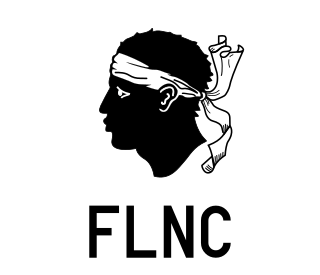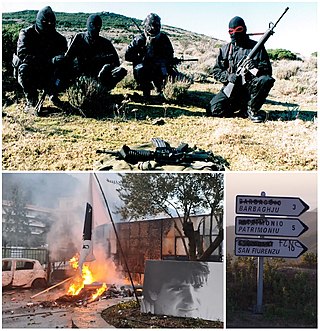Related Research Articles

Haute-Corse is a department of France, consisting of the northern part of the island of Corsica. The corresponding departmental territorial collectivity merged with that of Corse-du-Sud on 1 January 2018, forming the single territorial collectivity of Corsica, with territorial elections coinciding with the dissolution of the separate councils. However, even though its administrative powers were ceded to the new territorial collectivity, it continues to remain an administrative department in its own right. In 2019, it had a population of 181,933.

The National Liberation Front of Corsica is a militant group that advocates an independent state on the island of Corsica, separate from France. The organisation was primarily present in Corsica and less so on the French mainland. A Conculta Naziunalista was often considered to be the political wing of the organisation.
Armata Corsa was an underground separatist terrorist organization in Corsica, founded in 1999 and disbanded around 2001.

Léo Battesti is a Corsican chess enthusiast, activist, and retired politician and militant.

Corsica is an island in the Mediterranean Sea and one of the 18 regions of France. It is the fourth-largest island in the Mediterranean and lies southeast of the French mainland, west of the Italian Peninsula and immediately north of the Italian island of Sardinia, the nearest land mass. A single chain of mountains makes up two-thirds of the island. As of January 2024, it had a population of 355,528.

The history of Corsica goes back to antiquity, and was known to Herodotus, who described Phoenician habitation in the 6th century BCE. Etruscans and Carthaginians expelled the Phoenicians, and remained until the Romans arrived during the Punic Wars in 237 BCE. Vandals occupied it in 430 CE, followed by the Byzantine Empire a century later.

An Islamist insurgency is taking place in the Maghreb region of North Africa, followed on from the end of the Algerian Civil War in 2002. The Algerian militant group Salafist Group for Preaching and Combat (GSPC) allied itself with al-Qaeda to eventually become al-Qaeda in the Islamic Maghreb (AQIM). The Algerian and other Maghreb governments fighting the militants have worked with the United States and the United Kingdom since 2007, when Operation Enduring Freedom – Trans Sahara began.
Yvan Colonna was a Corsican nationalist convicted for the 1998 assassination of the prefect of Corse-du-Sud, Claude Érignac. He was beaten to death in prison by an inmate, sparking riots.

Corsican nationalism is the concept of a cohesive nation of Corsica and a national identity of its people. The Corsican autonomy movement stems from Corsican nationalism and advocates for further autonomy for the island, if not outright independence from France.

The Italian occupation of Corsica refers to the military occupation by the Kingdom of Italy of the French island of Corsica during the Second World War, from November 1942 to September 1943. After an initial period of increased control over the island, by early spring 1943 the Maquis had begun to occupy the hinterland. In the aftermath of the Armistice of Cassibile, the Italian capitulation to the Allies, some Italian units sided with German troops sent to replace the Italian garrison and some defected to the Maquis and Free French Forces.

The Corsican conflict is an armed and political conflict on the island of Corsica which began in 1976 between the government of France and Corsican nationalist militant groups. Beginning in the 1970s, the Corsican conflict peaked in the 1980s before Corsican nationalist groups and the French government reached a truce in 2016. It is currently ongoing following the 2022 Corsica unrest.

The 2015 Corsican protests were a series of marches by several hundred Corsican nationalists that began on 25 December, in Ajaccio, capital of Corsica. During the initial demonstrations, a Muslim prayer hall was burned down and Qur'ans were set alight. Further protests were organised after the initial march despite a government ban on protests until 4 January 2016. The protesters claimed to be acting in revenge for an incident that occurred the day prior when firefighters and police were assaulted in the neighbourhood of Les Jardins de l'Empereur; however, outside observers labeled the ensuing riots as anti-Arab and anti-Muslim. The Corsican nationalist politicians have claimed their view does not legitimise xenophobia, blaming the protest on French nationalism instead. Scholarly opinions on this claim are divided.

Pè a Corsica was a Corsican nationalist political alliance in France, which was calling for more autonomy for Corsica. More specifically, it was a coalition of the two Corsican nationalist parties active on the island; that is, the moderately autonomist Femu a Corsica and the strongly committed separatist Corsica Libera. The party was led by the autonomist Gilles Simeoni. The alliance was renewed for the 2017 territorial election. However, the alliance was dissolved for the 2021 territorial election.
The insurgency in Bahrain is an ongoing insurgency by militant groups, part of the Bahraini Opposition, supported by Iran, to topple government of Bahrain.

In March 2022, the island of Corsica, France, saw protests in response to a prison attack on nationalist leader Yvan Colonna. There were rallies in the main cities of Ajaccio, Calvi and Bastia that descended into violent clashes between police and protestors. Protestors threw stones and flares at gendarmes.

Corsican autonomy is the principle and a movement for autonomy or self government for the island of Corsica, with political powers devolved from the French government.
References
- 1 2 "16 injured in Riviera bombing | World news". The Guardian. Retrieved 2018-07-20.
- 1 2 "BBC NEWS | World | Europe | Corsica militants 'admit' blasts". news.bbc.co.uk. Retrieved 2018-07-20.
- ↑ "La piste corse " confirmée " après deux explosions à Nice - 21/07/2003". ladepeche.fr. Retrieved 2018-07-20.
- ↑ "Partager sur Facebook". nouvelobs.com. Retrieved 2018-07-20.
- ↑ "KUNA : Bomb explodes at French military facility in Nice - Military - 10/10/2003". kuna.net.kw. Retrieved 2018-07-20.
- ↑ "Attentat de Nice: la piste corse". Libération. Retrieved 2018-07-20.